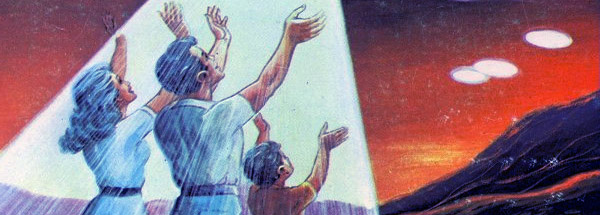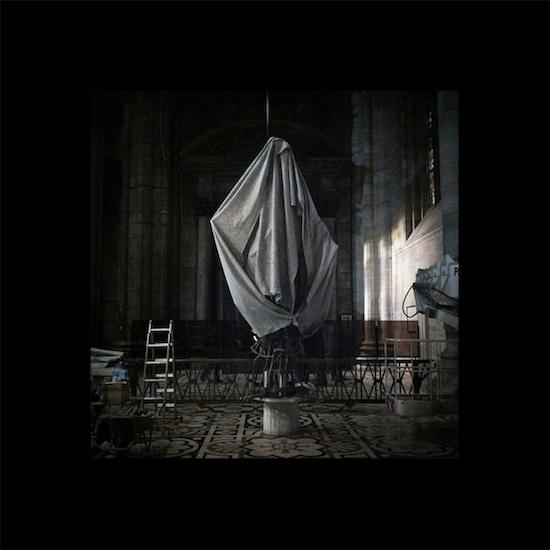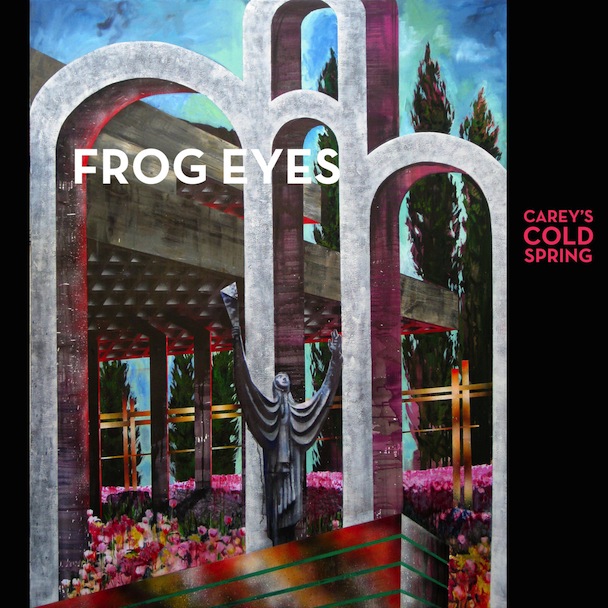
Features | Lists
By The Staff

10 :: Chance the Rapper
Acid Rap Mixtape
(Self-released)
Let me take a trip down memory lane. When you’re young, nostalgia comes so hard and fast that it sometimes feels like innocence was just the other side of a 10-day high school suspension that launched your career. One day you’re playing Nintendo, and trying to fool your grandma into thinking you’re straight, the next you’re trying to excise the demons of the friend you saw stabbed to death and meanwhile you’re getting called up by Justin Bieber.
Sure, Nas and Rakim were both 20 when their game-changing albums came out, but while those records often seem to be trying to consciously shed the fresh faces of their creators in favour of something more world-dominating, Chance the Rapper carries a willful, inescapable sense of his age all over Acid Rap. Call it a product of a time when the musical landscape sheds its skin anew every year (mind-blowing fact: Chance’s early childhood hip-hop memories don’t extend beyond Kanye West’s first album) but also when the proliferation of music is limitless. The weight of Chicago’s music history is all over this record, but incidentally, it’s too like Chance just picked this up one night while kicking cans down the street and chain-smoking at the tail-end of an acid trip. Case in point: the album seemingly ends in a brilliant splatter of ragtime brass, but post-fake-out returns with an obnoxious juke jam (where some helium-infused voice actually chirps out “jukejukejukejukejuke”). So esoteric and precarious is the internal logic of Chance’s revelation/absurdity balance that the more put-on provocations of Action Bronson and the hustler-professionalism of Ab Soul actually seem to disrupt its Zen. Is this the first time, perhaps, that otherwise decent raps have thrown off the flow of an album whose main strength is its lack of focus?
Brent Ables in his review asked “Who listens to rap for the love songs?” I’d have two answers to that: one is “Me, when it includes ‘Lost,’” an ode to the impenetrable orbit that surrounds two young, needy, narcissistic lovers, and which features the best guest spot on the album from relative unknown Noname Gypsy (“Miss Mary Mattress / Geriatrics / Fuck me into open caskets”). Its real object of affection is the very impermanence and mutual misunderstanding of its two protagonists. My second answer would be that every track on here is a love song of some sort. Even when Chance exhibits the breathless fury of Eminem, it seems to dissolve into sweetness at some point. Not that he’s soft, but that rapping itself seems to carry so much internal satisfaction: Acid Rap is a love song to daisy chains of rhymes and cosmic bending of vowels, to drug-addled confusion, to Chicago—at least the one he sees on the back of his eyelids.
► “Smoke Again”
► “Acid Rain”
► “Lost”
Joel Elliott

9 :: Jenny Hval
Innocence is Kinky
(Rune Grammofon)
I want to write about every inch of Innocence is Kinky in the same way it wants to slither across every corner of the human body, seen or unseen, until in the crease of a limb—a stop—it finds a human. But we’d be here all day, so instead, I’ll consider Jenny Hval’s broader study: “What,” she asks, peering down at the soles of your feet and the veins in your arms, the breasts and receding hairlines, the dicks and open eyes, “is human?”. It’s a question posed on “The Seer,” in the record’s slow, ambient-crushed embrace with death (as if to say: “Is anything?”), but it’s not rhetorical. Innocence is Kinky is in fact an empirical study with that question as its hypothesis, Hval running her hands through the body like a kid rattles his or her hand across the bars of a chainlink fence. It’s data collection, curiosity that needs completing, callous noise with an antiseptic plaster wrapped around it. What are we healing here exactly?
Back to our main question, though: what is human? To some extent, Hval might call it a physical being, and so her music is pulverising, connecting with the ears at a primitive level. “Give Me That Sound” is made up of descents into different floors of dissonance, travelling through them on the elevator, leaving the listener frantically pressing buttons to stop her distorted vocal assault. She puts us in situations so overwhelmingly physical that they become identity epiphanies, confrontations with oneself, but with none of the indifference a mirror would reflect. The record’s title track tries to make us see our body in its most private moment—private, in this sense, being that which nobody else can ever see. The sounds are physical because they see the isolation: “That night, I watched people fucking on my computer,” whispered louder than any scream, is the lyric we’ll remember, but “No one can see me anyway”? That’s the clincher. The moment where Hval can be there when no one else can, when something exists between seen and not seen—that is the very feeling Innocence is Kinky lives to capture.
Hval’s voice seeks out the space between what your hand touches and the air it floats through. She breaks down consonants as if each one has its own ritual, hissing “smoke rings from my pussy” until the words intermingle with the vision and make it real. Or take the way she snarls the letters “L-C-D” in a line, their chronology turning and twisting with the peaks of her voice. Or the way song and speech fight each other, her spoken word treatises falling into melodies sung in her highest vocal range, like two people talking. Or the total collapse of her voice, worn like a body: on “Mephisto in the Water,” her voice disappears at the end of a soft, watery ballad. “I’ll run out of you,” she sings, squeezing the words out before she loses their sounds. Or just listen to this distinction: “Like sex, without the body.” She intones it once, her voice creaking of its own accord, and then again, with another piercing whisper: “like sex without the body!”
Because the body doesn’t do the sex justice. Innocence is Kinky stands like a strand of gorgeous, gruesome evidence proving that. Because, it says—screams, sneers, snarls—music can be physical without touching you. Music is an awesome shiver, the feeling that you’re in the presence of someone else when all you are is this one collection of limbs, interconnected and barely connected. Innocence is Kinky is a collection of songs that shoots straight down my spine, with any of its chosen methods—its sharpest synth line or its most disorientating juxtaposition of sound and silence. More importantly, that is its conclusion. On Innocence is Kinky Hval runs her hand through the body but it feels like invisible state to invisible state to invisible state. What is human? It’s what the body feels, not what the hand does.
► “Mephisto in the Water”
► “Amphibious, Androgynous”
► “The Seer”
Robin Smith

8 :: Deafheaven
Sunbather
(Deathwish)
The first known appearance of the term “deaf heaven” in the English language occurs in William Shakespeare’s “Sonnet 29,” a poem which reads like the inspiration for Deafheaven’s sophomore record, vocalist George Clarke describing Sunbather as an album about the dream of a perfect existence and the tension that creates with our impoverished, decaying realities. Whereas most black metal or hard-edged rock bands of Deafheaven’s ilk would likely have used that theme to express a malcontent rage and launch a visceral assault, Deafheaven instead look to a shuddering grandeur to make their point. Like Billy’s sonnet, they seem intent on finding the grace notes in the internal conflict, every last one, and then arranging those notes into the most epic ode to real joy I’ve heard in a minute. So Sunbather might not be the “best” album of 2013, but hell if it’s not the biggest, and big in a way that matters. It completely sweeps one away.
And it’s bracing. The drumming is often what you’d expect in genre—absurdist maximalism—but it’s not four minutes into the record when Daniel Tracy delivers a 4/4 downbeat on snare that ensures your head’s rhythmic allegiance. Guitarist and co-founder Kerry McCoy seems to be looking for the simplest possible ways to craft chord progressions and lead parts that are both fresh and effective; he hits a home run, earning the shoegazer and best-of-’90s-indie-rock comparisons while finding a context in which to subvert them. Also, I have to say, it’s getting increasingly rare to hear a musician explore what the electric guitar can do on an elemental or structural level instead of through an abundance of production effects or striving to complement a groove. Never ornate, pensive yet confident, McCoy’s guitar takes us places as listeners that we are all too happy to go, that we’ve never been before or feels like ages since we have. And in the album segues the band indulges whole-heartedly everything besides metal: low-key dynamics, GYBE-esque recordings, piano chords at the end of “Irresistible” that sound like the layman shit I play at home. But this record’s concessions to something bigger than its niche go beyond the post-rock breakdowns and genteel interludes; distortion, blast beats, even Clarke’s shredded screamo vocals—all somehow used in a design towards giving out max euphoria. It’s black metal, but black under sugar ‘n’ cream while the roast itself is velvet.
And yet the black metal purists will declare that, fundamentally, this is not black metal, and that’s probably fair enough, though not so much for the stylistic variances as for the fact that Deafheaven take black metal’s god/anti-god complex and turn it on its head. Man of Steel is a shit movie but has a not-so-shit line where Jor-El hammers home the Christ-figure mission for his son Superman, stating that Supes will give the human race an ideal to strive for and they will chase after him and fall but eventually will join him “in the sun.” Sunbather affirms two very important things: 1) music is divine, and 2) we can have righteous communion with and through it.
There’s a great Youtube video of Deafheaven performing “Dream House” at a show and the front row of the crowd is utterly caught in the music’s throes, reaching to the sky, performing along with the band, enraptured. Having grown up in the church, I’ve sort of seen this scene before. Thoughts drowned, senses subsumed, Nirvana is bliss but not exactly ignorance; it’s the heightened awareness of one thing at the expense of others, that one thing being the unbearable presence of Now. Pain, ecstasy, and the sublime on amplifiers, while Clarke howls at a confrontation with an “ocean of light.” Sorry, Shakespeare, but heaven is deaf because its music is so fucking loud. Worship.
Chet Betz

7 :: Majical Cloudz
Impersonator
(Matador)
People who shouldn’t will die, childhood ends, reality is a hologram, and art is a lie. Bugs don’t buzz when their time approaches. We’ll be just like the roaches. My love is fake. If Devon Walsh was a magician, he’d dress like a longshoreman and stare at a crate with a woman projecting out of both ends like he’s immersed in shadows from the back of a dive bar. He’d be pondering what kind of monster would consider cutting a woman projecting out of both ends of a crate in half. Or he’d be pondering the fate of the crate itself. And the audience would just wonder, in silence, if he’s forgotten he’s supposed to be putting on a magic show.
In September I saw Majical Cloudz for a second time, headlining, when the first time in March they toured behind Autre Ne Veut. The two bands shared similar live sensibilities, and so at the time their pairing made sense: like the best karaoke you’d never witness in the confines of a vaguely Japanese-themed watering hole, both acts placed all focus on the pipes of their formidable singers, otherwise setting the track’s foundations with the push of a button or pressure pad or key and watching their astral cores writhe and burn under the self-sustaining power of a lifetime of emotions folding into collapse. Walsh, who had recently signed to Matador after leaving the fertile terra firma of much smaller Montreal label Arbutus—where his rise to notoriety was presaged by his friend Grimes—seemed to be still morbidly unsure of how his partnership with instrumentalist Matthew Otto would translate to the stage. In his eyes, frog-bulbed, spored a preternatural disconnect from the service he was tendering. If Devon Walsh was a performing musician—and suddenly he was—then he wore a uniform of blue collar asceticism and stared at the audience like he was a lemur trapped behind glass. He was pondering what kind of delusional egomaniac would get on stage and recreate such deeply personal art, as if solipsism was entertainment, as if anyone could be moved enough to follow—or care. And the audience wondered, in rapt silence, if he was OK.
In September I saw Majical Cloudz for a second time, on a Wednesday, and for a crowd of 30 or so under lamps that were probably a bit too bright, Walsh asked if anyone wanted to join him on stage for a push-up contest. A woman who identified herself as a fitness instructor quickly raised her hand, and soon those of us in the audience who may or may not have done any push-ups in the foreseeable past were counting down the rivals’ increasingly gasped grunts. The rules weren’t exactly clear as Walsh explained them; the conceit seemed to be, only: hey let’s do push-ups together until we can’t. I don’t remember who claimed glory—she did, probably, though Walsh’s biceps are framed well by a plain white tee-shirt, the sum total of his silhouette best described as that of Marky Mark in Pain & Gain, but skinheaded. If Devon Walsh was a gym rat—-and some people who look like that just do, without effort—then his very skin would bulge with the tireless attention to detail required of an obsession with idealism marred by truly heartbreaking self-doubt. And the audience wondered why every live band’s performance couldn’t be like this.
Impersonator isn’t Majical Cloudz’s debut, though it might as well be. It’s a singular vision wrestling with singularity, a voice—a voice that bends the reality of words, that kills them or holds them aloft, like saying anything too many times, over and over, until it sounds foreign and uncomfortable—crying out not from some vast wilderness of potential, but from a dark corner, from behind the glass in a small terrarium, from the mildewed shower in the middle of the night at a 24 Hour Fitness, made swarthy and large by the weirdest ways it bounces off slabs of pavement or glazed tiles colored like the bottom of a milk carton. Walsh’s voice throughout is both confident and fettered, as are Otto’s spare accompaniments, beholden only to a sort of intuitive sense of song structure, or a half-remembered hook, or a single cold, whittled feeling. He’s a guy whose livelihood is in art, and here’s his art, and it’s about being that guy, and so much of Impersonator, both on record and live, regards artifice as a matter of fact: unless Walsh is being sincerely autobiographical, then how can any audience connect emotionally to a lie? Even then, by contextualizing his confessionals—if that’s what they are—within the shuttered room of a 10-track LP, he must be manipulating us ever further, showing us where to listen, and how, and how to feel about that. It’s a treacherous, illusory craft in which he’s invested himself.
On “Notebook,” to the plaintive bleats of a deep-seated organ, Walsh catches someone by the arm: “Hey man, sooner or later you’ll be dead / I want you to know I got respect / Both of us have seen the light / It caused an obsession.” It could be a friend, or a father figure, or someone more nebulous, yet: “See you in your hospital gown / Never let surroundings bring you down.” I suspect he’s speaking to us, to his listeners, or maybe even to anyone who spends some serious time with an album consisting of 40 minutes or so of music. He sings of context and of compulsion, two important aspects of music fandom, and in a song that seems at first about mortality and closing one’s existential loops before there’s no time left to do so, that he may in fact be singing about the act of listening to his music in the first place—the faith required of those who take a risk to submit themselves, and their fleeting time, to a piece of art—speaks, at least for me, to the heart of why we’re doing exactly this, right now, at this moment: writing about music, making a list brimming with hyperbole, all with the flaccid hope that you, the person reading this, may in some way connect to these words enough to carry on and connect, or try to, to music that’s shaken me—us—ineffably.
One song before, on the magnificent “Bugs Don’t Buzz”—really, there can’t be another song this year that seems conceived only to draw one’s skin to goosebumps, to be as visceral as it is hollow, cavity and guts both in two notes—Walsh surmises, “If life could be forever one instant, would it be the moment you met me? / No, my love.” To think he could be speaking to us? Am I his love? If life could be forever the moment I met this album—no, it’s better to wonder, in rapt silence, if every album could be like this, if Devon Walsh is OK, and if he’s forgotten that he’s putting on a show for us.
► “Childhood’s End”
► “Turns Turns Turns”
► “Bugs Don’t Buzz”
Dom Sinacola

6 :: Tim Hecker
Virgins
(Kranky)
The 10-year trajectory from Haunt Me, Haunt Me Do It Again (2001) to Ravedeath, 1972 (2011) represents what can already be classified as the most awe-inspiring succession of releases in the field of contemporary experimental electronic music. An air-tight collection of refracted imagery, recurring motifs, and reconstructed textures, spread across landscapes both real (“Music for Tundra”) and, well, imagined (An Imaginary Country [2009]), the Tim Hecker catalogue continues to exist in a sort of liminal state suggestive of the very abstract impressions his music provokes, from hallucinatory experience to apparitional identity to spiritual and environmental evolution. In fact, this arc, from the tense and often self-conscious optimism of his early work (“Night Flight to Your Heart,” “Incurably Optimistic!”) to the paranoid technological renouncements of his recent output (“Hatred of Music,” “Studio Suicide, 1980”), has been so expertly charted and traversed that Ravedeath couldn’t help but feel like an endpoint, an effective reconciliation of Hecker’s major thematic preoccupations and aural insinuations.
Virgins, then, is a rebirth. Composed for a small orchestral ensemble and performed by a tight unit of avant-garde luminaries, including Ben Frost and Valgeir Sigurðsson, the album retains Ravedeath’s live, semi-improvisational recording conceit while putting its emphasis less on electronics, more on acoustics. Ravedeath was the sound of an artist losing his faith not in his medium but his method. So while elements of drone and ambience certainly lurk in the shadows of Virgins, the experience itself is more immediately palpable. Strings and cello, piano, organ, woodwinds, and harmomium all find ample room to navigate the literal and figurative space afforded such a set-up. Like its artwork, Virgins is stark, vaguely ominous, and calmly evocative of religious iconography past and present.
In contrast to the conceptual currents running through many of Hecker’s most lauded efforts, the sonic climate of the recording itself seems to be the thematic backbone of Virgins. Instruments alternately dovetail toward divinity (“Virginal I” and “Virginal II”) and devolve into dissonance (“Stab Variation”), often times within individual pieces (“Live Room”) echoing through the cavernous spaces Hecker and his collaborators have aurally outlined in conjunction with the physical properties of their instruments and environment alike. Freed of such concrete conceptualization, Hecker is allowed the latitude to focus fully on both performance and dynamism, evidencing an inspiration in the electro-acoustic intuitiveness of jazz and the precision of minimalism while managing to retain an aura of suggestiveness, thus extending the kind of visual symmetry which exemplifies his greater aesthetic. At once turbulent and serene, disarming and typically breathtaking, Virgins finds Tim Hecker laying bare the human component of his cerebral constructions, the word once and for all made flesh.
► “Virginal II”
► “Live Room”
► “Sketch 5”
Jordan Cronk

5 :: My Bloody Valentine
m b v
(Self-released)
I seem to notice an inverse correlation between whether or not one writes their dreams upon waking and whether or not one enjoys the music of My Bloody Valentine. “Hypnagogic” gets thrown around a lot, and while it’s nowadays mostly associated with 2008 synth-pop and DMT, this word (the period of time between sleeping and consciousness) best describes the whole shoegaze woosh. At least for me: I’ve found that my own dreams are often so unnerving I can’t shake their effects for weeks. It doesn’t matter that my attempts to write them down are fruitless in conveying their power; the associations they create, my conviction that there has to be something there, is based on the palpability of the dream, that I can see and touch and hear these frankly unbelievable things.
My Bloody Valentine recreate this effect in the most powerful way for this listener. It’s not that they’re drone artists, or trance or stream-of-conscious or experimental—they incorporate important elements of those things, but if Kevin Shields didn’t think to write actual melodies to his loud guitars then it wouldn’t be genre-defining, so vastly rewarding. It’s just that there’s a thread in the band’s music, an iron clad structure and scaffolding even at its most discursive, which still manages to be recursive in that somnolent déjà-vu. It has to mean something, doesn’t it?
Then again, it could also just be the way that Kevin Shields hears his own band: surrounded by a phalanx of amplifiers, his sonically overmatched bandmates yards upstage. This might explain why m b v, released all of a sudden after 21 years’ anticipation, isn’t quite the capital-S statement the occasion calls for. It is, triumphantly, an excellent My Bloody Valentine album. This isn’t to undersell it; this is not a case where, to paraphrase my friend’s oft-used putdown, “at least of all the bands that sound like My Bloody Valentine, [My Bloody Valentine] do it the best.” What separates Shields from his competitors and his followers is that his devotion to the sound in his head is absolute. Because the stock Kevin Shields trademarks are all fairly cheap tricks, and well worn ones at that; the tremolo bar is older than Jimi Hendrix. But 20 years of microphone moving and infinitesimal EQ balancing might very well be what makes his Jaguar sounds like it does on “Is This and Yes,” and “In Another Way,” and the result is bracing. I’m sure his clones can buy his gear, but I don’t know if any of them can create that perfect curlicue of a solo throughout “Only Tomorrow.” m b v is not Loveless (1991). It is, thankfully, a brilliant My Bloody Valentine album.
► “Only Tomorrow”
▲ “She Found Now”
Christopher Alexander

4 :: Oneohtrix Point Never
R Plus Seven
(Warp)
I started admitting to people about halfway through this year how much time I spend listening to Oneohtrix Point Never, but it started a long time before that: probably two years ago, on a near-empty floor in a high rise between the pretty buildings downtown and the big orange-lit lake, I took my laptop and some headphones to a quiet corner (they were all quiet) to do some work and, there, ran through Replica (2011) and Returnal (2010) a few times on repeat. I’m not quite sure what work I got done that day; what I remember, rather, is the corner: a hulking abandoned corporate desk, too big to really sit at; a wall nearby sliced in half by the shadow of a nearby building; the imperceptible slow-motion of the cars and tourists far below. The decision to drink a vat of coffee a couple times per week and listen to everything by Oneohtrix Point Never became a fairly regular one, thereafter (the Rifts [2012] box set really helped), but I as much associate that abandoned corner with the music as I do the sounds. It filled the space, created a sort of cast of it.
The ambient, deeply sci-fi work of Oneohtrix Point Never has always been interested in just such frozen worlds, but never with such architectural intention as on R Plus Seven (see also: the polygonal cover art, the video for “Problem Areas”). It’s probably best, I’ve found, to approach this music as a sort of place to be explored. This could be said for a lot of ambient music, I suppose, but the difference is that Lopatin has never been interested in just empty space. He fills it with things; he would have us meander and, at times, run. Again, look at the cover: there is surface here, not just space. The objects we encounter are just as important, if not moreso: the moments when we’re prompted to interact with individual flourishes (as on the rushes of found sound or the brief, implied melodies of “Inside World”) or when we find ourselves, after a spell of wandering, happening upon something ethereal, as at the end of “Chrome Country,” or awful, as at the end of “Still Life.”
I’m probably conflating the visual with the musical, again. I’m reading, in the violating, overlapping synthesizers of “Still Life,” something of its video by Jon Rafman, which seems to have scraped the crud off the ends of the Internet and reassembled it for maximum emotional resonance, and which, at that climax, assaults the viewer with violating, overlapping images of tentacle rape, disembowelment, cumshots, and so on. Troubling as the images are, at least displayed like this, it seems to be reveling in humanity as it exists inside a machine, and the ways in which the pleasures of each help us forget the other. Which, yes, is sort of the skeleton key here: R Plus Seven sounds not so much like the soundtrack to a videogame but like the auditory equivalent of one, a sort of self-contained digital cosmos into which we are invited, and through which we haltingly explore. Ambient music has a long and complex idealogical history, but if that’s not the future of it I don’t know what is.
► “Zebra”
► “Problem Areas”
▲ “Boring Angel”
Clayton Purdom

3 :: Friendzone
DX
(Self-released)
Waking up sucks. At 6 AM, in Winter, London is a wash of breakfast and road signs. Honks. Street lamps that more cuss out the light than anything else; here, there are subdivisions of mist. Shit is fucking cold, you know? And when you’re commuting to work in an ad hoc scarf-and-parka ski mask, with one eye trained on an 8 AM start—your mind still in that sleep-sinkable state, all gelatin, as your thoughts feel both broad and devastatingly negligible—when you’re commuting to work, you have time to, sort of, sweat over the little stuff in a resolutely “big” way. There’s a kind of astral smoochiness about being half-asleep and considering very deeply the ramifications of nothing in particular. It’s this feeling of incumbent and out-there everything-ness that totally defines DX as an album, and may also explain why my best experiences listening to it were when I was severely conked out on my ride in to work.
Friendzone’s long-awaited debut LP—which started life as a beat tape for Kendrick Lamar—is many things, including, on one track, a bizarre homage to early Sigur Rós. There is a track that sounds exactly like Aphex Twin, if he remixed, say, the Spice Girls. As an album, DX is curiously alpha-wave deficient. It is a smooth, unbroken trace on your mind’s-eye’s encephalogram: this thick fuzz made of cavernous dream-speak, unsparing melodies, and a sense of rhythm that is so tight—and allusive—it borders on the physically overwhelming. Friendzone are here to literally affect you, and it is the great achievement of their body of work so far that their method is almost entirely indirect. There is no through-line; only jig-saws of rapidly intersecting parts, like a great Doppler wave shimmying its way through ’90s IDM, Herbie Hancock, and whirry sound-effects from old Nintendo games. Its rhythms are unsinkable and insistent.
Where other instrumental records this year rolled-out a blueprint of secular confinements (like Tim Hecker’s Virgins, which for all its obvious brilliance is almost throat-pluggingly oppressive), the map on DX seems endless: it is probably the year’s most culturally omnivorous and footloose expression of unbridled distraction, which, tonally, comes across as a kind of joy and a kind of sadness. Each of these 12 tracks is one big, vague endless feeling, ready to be un-packed when you least expect it, and ready to comfort you in your half-consciousness.
► “Taswell”
► “Passion Breathing”
► “Poly”
Alan Baban

2 :: Danny Brown
Old
(Fool's Gold)
When Kendrick Lamar dropped a verse longer than 16 bars and unwittingly gave a PhD in the KRS-One School of True Hip-Hop to every motherfucker with a Twitter account, he crystallized, for me at least, why I had to drop out of the rap (critic) game. The conversation has gotten louder but the opinions in it are too narrow. (“Leave me alone with my books and my wives,” I say, throwing down my horn of ale.) Don’t get it twisted: the verse is ridiculous, and Good Kid was my album of the year last year. But given the choice, I’d take an album like Old any day. We’ll still be appreciating Good Kid in ten years, but in ten years we’ll still be figuring a motherfucker like Old out.
The This Heat and Kid A (2000) references remain apt, if misleading. We’ve spent all year putting together different analyses of what “old” means in which context and how this intersects with “Paranoid Android,” but let’s take it easy: this is post-rap, laying waste to the conventions of the form and constructing something new with the rubble. Or just kicking the rubble around; it’s hard to tell when you’re this fucking high. Indeed, the general aesthetic of the album appears to be “things that sound good while on molly,” and, if there’s an overarching theme, it appears to be “using molly.” But then, why such meticulous structure? Why does it build, not toward the grand, macabre climax of XXX but toward ever more drug use? Is this the ecstasy-rap equivalent of Dopesmoker (2003): a full-album paean to a single narcotic experience?
Sorry, world: I don’t have the answers. Like I said up top, ask me in a decade. That Old raises these fundamental structural questions while still sounding like fucking rap music and not like an Anticon also-ran slots it pretty neatly alongside New Amerykah, Part One (2008) and Black Up (2011). But that very rap-ness also pinpoints something else going on here. While Brown is eons more sonically attuned than even a gifted curator like A$AP Rocky, he remains an emcee, first, last, and foremost, and for all the abrasive wonder the album creates it’d be unlistenable as an instrumental. The man is nothing but pure, seething rapper. In diction, word choice, wit, delivery, cadence and every other possible statistical category—“hottest interviews, realest stories,” and so on—Brown scores perfect 10s in the KRS-One School of True Hip-Hop. But in picking up the almost visionary sense of nonconformity that Ghostface and MF Doom tossed down in disdain or apathy almost a decade ago, he makes good on the promise of XXX. There isn’t even a question: Danny Brown is the best rapper alive.
► “Red 2 Go”
► “Lonely”
► “Kush Coma”
Clayton Purdom

1 :: Frog Eyes
Carey's Cold Spring
(Self-released)
Carey’s Cold Spring is a record of life. It is a document and a teaching: it wants you to be okay. It says, the world is sick; the world is sad; but what’re you gonna do but try and make it glad? It says, don’t give up your dreams. It says: reform. And what it says sounds strange to us in 2013 because we aren’t used to speaking to each other this way, with a quivering voice and a true heart. This is not a record that has much use for the smirking luxury of irony. It quietly refuses to be part of a culture complicit in its own exhaustion. Perhaps this is because it was created out of the knowledge that real exhaustion, if you follow it through long enough, leaves you with a desire for life whose phantom stimulation can only simulate. The knowledge that suffering doesn’t have to be for nothing, even if all you will ever know is suffering. Carey’s Cold Spring won’t heal anyone, and it won’t tell you how to raise yourself from the dust. But you will find it easier, after listening, to do those things on your own if you need to. This is only a record. But this record is a blessing.
*****
“Reform for the light.” Actually, it’s not a record. It’s a self-released digital download, and you can find it right here. And if you don’t need to reform? It doesn’t matter. This is an entry in the art of sound, and in its cumulative force, grace, and impact it is unrivaled by anything else released this year. These songs sound as though they were carved by wind out of the hills, taking shape as crests and valleys rather than verses and choruses. It’s not a map, it’s the territory; will, not idea. “An air worth recording.” I guess it’s a rock album but it doesn’t sound much like any other rock album I could name. Frog Eyes has always traded in a pre-modern romanticism of the macabre, but there’s something more elegant at work here. The chaotic bluster of the preceding records has been reigned in, the energy redirected into pure intensity and a resoluteness abstracted from all resolution. Carey Mercer used to play guitar like Jimi Hendrix, now he plays guitar like Rodin. If Paul’s Tomb (2010) had one fault, it was its failure to find a proper balance between Mercer’s frenzied narration and the punctuated bursts coming out of his dying amps. Here they complement each other like 3 AM and a glass of whiskey.
The 9 songs on Carey’s Cold Spring are stories, each fragmented and abstract but centered around imagery as memorable as an exorcism. “The Road is Long” belongs to Judith, a troubled woman we last encountered on Paul’s Tomb. Judith is besieged by angry harpies and a vengeful sea, but she can’t escape because the road is blocked by a messianic cop stealing holy clocks. “Don’t Give Up Your Dreams” is concerned with a nightmarish insurrection represented by Black Bloc Rita, who spouts inspirational maxims and beats up maids (in disguise) when she’s not trying to steal your car. Sometimes the subjects don’t even have names, like the doomed spirits of “Your Holiday Treat.” (“Born in a sack! / Born in a sign! / Born in a bottle at the bottom of the brine!” Mercer’s lyric sheets are replete with exclamation marks, his passion overflowing into his punctuation.) Scattered throughout these stanzas are the maxims that form the epiphanic core of the text, and that Mercer’s arrangements privilege above the narratives. If there is an interpretive question raised as to how the affirmations of the surface fit over the strange, unsettled depths of these broken souls, it properly belongs to the listener negotiating that conflict in her own.
Engaging Mercer’s lyrics for any time at all brings home just how rare this kind of literary richness is in contemporary music. Is it geography? In 2006, on the opening track of Destroyer’s Rubies, Mercer’s friend Dan Bejar memorably dissed the entire American underground on the basis that there’s “not a writer in the lot.” But he didn’t say anything about Canada. The same year also found Bejar and Mercer teaming up with fellow British Columbian Spencer Krug for the Swan Lake project. It sounded like a boar dying in a tar pit, but I challenge you to name a more formidable gathering of lyrical talent outside of hip-hop this century. Sure, Bejar has a maddening habit of resorting to freewheeling Dada collage in place of considered content, and Krug’s awkwardness sometimes skates by on barbarian charisma alone. But Mercer’s prose has remained sharp and expressive, his images harbor an elemental force, and his work is thematically concerned with only the deepest and highest of human experiences. If there are better writers in the American underground, I haven’t heard them.
*****
“Reform, before the thermostat cracks and gasps.” Spring in Canada can be quite cold. The last one froze me straight through. Thoughts that had once been light and mobile condensed into so many dull blocks of ice, their weight leaving me unable to lift my head from the pillow for days at a time. When nothing around you moves and time is the only form of change left, you discover you still have the power to curl it into refrains. To give shape to the void by harnessing becoming, the way Mercer does at the breathless apogee of “A Duration of Starts And Lines that Form Code.” 1, 2, 3, 4. 1, 2, 3, 4. 1, 2, 3, 4. “We must raid the dayside!” Guitars crashing like the tide. This is perhaps the most ecstatic, cathartic moment on the album and it doesn’t really mean anything. Mercer’s not a writer, he’s a songwriter. He insisted on this point in a recent interview, speaking of Bejar and, by extension, himself: “If he is a poet, he must write poetry….Take the music away, and you don’t have a poem! You just have a song without music, the saddest thing that I can think of.”
In this light, the song title takes on new meaning. “A Duration of Starts and Lines that Form Code” is, presumably, a description of a string of Morse code, where a sequence of meaningless elementary symbols combine to form meaning. On its own, an assemblage of symbols, events, and names is just “a song without music;” the synthesis that a master craftsman like Mercer gives them is something wholly intangible and irreducible to its parts. Something like what film critics call mise-en-scène, but more concentrated and intuitive. And it has the effect of lending the words a weight and an intensity that a poem could never convey. In the case of “Starts and Lines,” what Mercer wants to convey is unmistakable: “You should clean up your cuts / And it will fall away / Your shame shall fall away / Your shame shall fall away / And the bad little habit’s got to stop.” When you hear that last line, you know exactly what habit he means, not necessarily because you mean the same thing but because the song speaks for both of you.
Habit is a function of time, and in this sense you can choose either to let it repeat indefinitely (1, 2, 3, 4, “On and on, on and on, on and on”) or you can raid the dayside and move to higher ground. To shake off the patient, planless evils of habit—is this not the very meaning of reform? But you need something to put in its place, something to fill the time. “Is this love that you’re missing?” Then get off the internet. Or is it: “We want to be alone / We want a night so slow / We want to taste an air worth recording.” Should we “smash an apple on the face of the state?” If Carey’s Cold Spring has a final answer, maybe it’s the one from “Needle in the Sun:” “Forget the beauty of the rains / It is beauty that moves us along / Into the grass that strokes our graves / We shall be brave, we shall be gay / And stick a needle into the sun.” It’s an ambiguous message, praising beauty as what sustains us after telling us to let it go. Is it an acceptance of time, and where it leads us? Or a revolt? I think it’s both, or neither. And an admission that it doesn’t matter, because time will eventually claim you either way.
But you’re not there yet. Right now, you still have the elegiac beauty of Carey’s Cold Spring to move you along. All that I’ve said here, all I could say, merely hints at the power and depth of this record, and indeed of any Frog Eyes album. Maybe all that’s left to say then is just how immensely satisfying it is for me, for a lot of the staff, and likely for some of our longtime readers, to see this band finally take the top spot on a CMG year-end list. But forget about that. This isn’t a record, it’s a call to action. It says, focus on the fictions that move you and make them real. Don’t give up your dreams. I’ve heard talk in dreams about incredible songs where the body becomes a tonality of the earth. They sing of a place where the soul shall rise, like a burning shade of light. And nobody shall die.
► “The Country Child”
► “Needle in the Sun”
► “Claxxon’s Lament”





